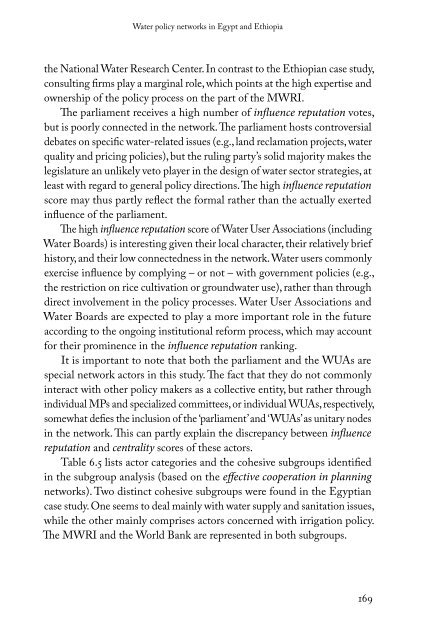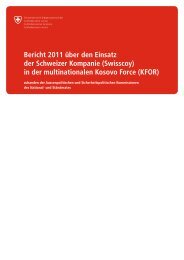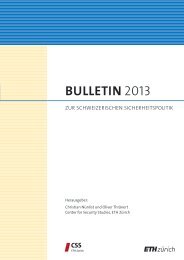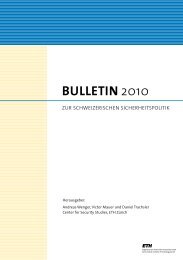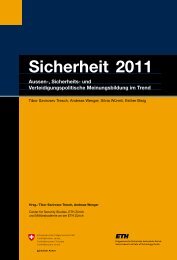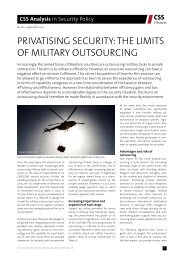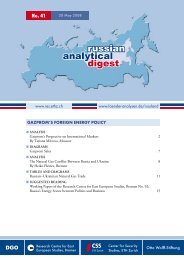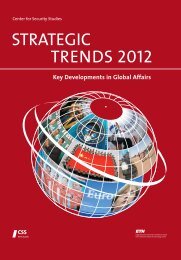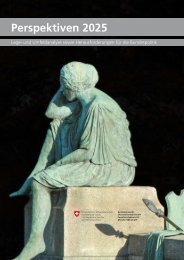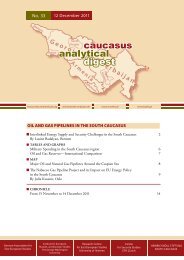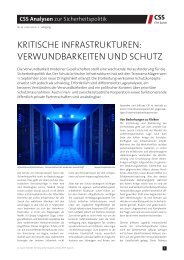Double-Edged Hydropolitics on the Nile - Center for Security Studies ...
Double-Edged Hydropolitics on the Nile - Center for Security Studies ...
Double-Edged Hydropolitics on the Nile - Center for Security Studies ...
Create successful ePaper yourself
Turn your PDF publications into a flip-book with our unique Google optimized e-Paper software.
Water policy networks in Egypt and Ethiopia<br />
<strong>the</strong> Nati<strong>on</strong>al Water Research <strong>Center</strong>. In c<strong>on</strong>trast to <strong>the</strong> Ethiopian case study,<br />
c<strong>on</strong>sulting firms play a marginal role, which points at <strong>the</strong> high expertise and<br />
ownership of <strong>the</strong> policy process <strong>on</strong> <strong>the</strong> part of <strong>the</strong> MWRI.<br />
The parliament receives a high number of influence reputati<strong>on</strong> votes,<br />
but is poorly c<strong>on</strong>nected in <strong>the</strong> network. The parliament hosts c<strong>on</strong>troversial<br />
debates <strong>on</strong> specific water-related issues (e.g., land reclamati<strong>on</strong> projects, water<br />
quality and pricing policies), but <strong>the</strong> ruling party’s solid majority makes <strong>the</strong><br />
legislature an unlikely veto player in <strong>the</strong> design of water sector strategies, at<br />
least with regard to general policy directi<strong>on</strong>s. The high influence reputati<strong>on</strong><br />
score may thus partly reflect <strong>the</strong> <strong>for</strong>mal ra<strong>the</strong>r than <strong>the</strong> actually exerted<br />
influence of <strong>the</strong> parliament.<br />
The high influence reputati<strong>on</strong> score of Water User Associati<strong>on</strong>s (including<br />
Water Boards) is interesting given <strong>the</strong>ir local character, <strong>the</strong>ir relatively brief<br />
history, and <strong>the</strong>ir low c<strong>on</strong>nectedness in <strong>the</strong> network. Water users comm<strong>on</strong>ly<br />
exercise influence by complying – or not – with government policies (e.g.,<br />
<strong>the</strong> restricti<strong>on</strong> <strong>on</strong> rice cultivati<strong>on</strong> or groundwater use), ra<strong>the</strong>r than through<br />
direct involvement in <strong>the</strong> policy processes. Water User Associati<strong>on</strong>s and<br />
Water Boards are expected to play a more important role in <strong>the</strong> future<br />
according to <strong>the</strong> <strong>on</strong>going instituti<strong>on</strong>al re<strong>for</strong>m process, which may account<br />
<strong>for</strong> <strong>the</strong>ir prominence in <strong>the</strong> influence reputati<strong>on</strong> ranking.<br />
It is important to note that both <strong>the</strong> parliament and <strong>the</strong> WUAs are<br />
special network actors in this study. The fact that <strong>the</strong>y do not comm<strong>on</strong>ly<br />
interact with o<strong>the</strong>r policy makers as a collective entity, but ra<strong>the</strong>r through<br />
individual MPs and specialized committees, or individual WUAs, respectively,<br />
somewhat defies <strong>the</strong> inclusi<strong>on</strong> of <strong>the</strong> ‘parliament’ and ‘WUAs’ as unitary nodes<br />
in <strong>the</strong> network. This can partly explain <strong>the</strong> discrepancy between influence<br />
reputati<strong>on</strong> and centrality scores of <strong>the</strong>se actors.<br />
Table 6.5 lists actor categories and <strong>the</strong> cohesive subgroups identified<br />
in <strong>the</strong> subgroup analysis (based <strong>on</strong> <strong>the</strong> effective cooperati<strong>on</strong> in planning<br />
networks). Two distinct cohesive subgroups were found in <strong>the</strong> Egyptian<br />
case study. One seems to deal mainly with water supply and sanitati<strong>on</strong> issues,<br />
while <strong>the</strong> o<strong>the</strong>r mainly comprises actors c<strong>on</strong>cerned with irrigati<strong>on</strong> policy.<br />
The MWRI and <strong>the</strong> World Bank are represented in both subgroups.<br />
169


